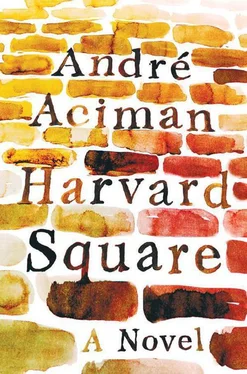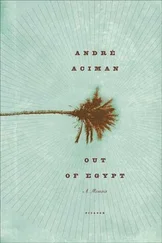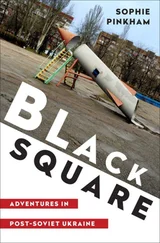Finally I found the courage to ask if he liked what he’d seen.
“I like it fine.”
But then, unpredictably, he turned the table on me and asked the same question. Had I liked it here?
I said I had. Very much.
But I knew I was speaking in retrospect.
“I learned to love Harvard after , not during .”
“Explain.”
“Life wasn’t easy,” I said, “and I don’t mean the course work — though there was plenty of that, and the standards were high. What was difficult was living with the life Harvard held out for me and refusing to think it might be a mirage. I had money problems. There were days when the margin between the haves and have-nots stood not like a line drawn in the sand but like a ravine. You could watch, you could even hear the party, but you weren’t invited.” What was hard, I was trying to say, was remembering I’d already been invited.
I was the outsider, the young man from Alexandria, Egypt, forever baffled and eager to belong in this strange New World.
The rest I didn’t want to think about or remember, much less discuss right now. Besides, the during memories of my years at Harvard felt tucked away still — not necessarily forgotten, but as though put on ice for a day in later life when I’d have the strength and leisure to revisit them. But now wasn’t the time. For now, it was the magical after love I wished to convey. It had stayed with me all those years and yanked me back to days I missed a great deal but knew I would never for a minute wish to relive again. Perhaps the after love was what made me embark on this odyssey of college stops with my son, because I longed to set foot in Cambridge again — with him as my shield, my cover, my standby.
How to explain this to a seventeen-year-old without destroying the carousel of images I’d shared with him since his preschool days? Cambridge on quiet Sunday evenings; Cambridge on rainy afternoons with friends, or in a blizzard when things went on as usual and the days seemed shorter and festive and all you wanted to imagine was tethered horses waiting to take you to Ethan Frome places; the Square abuzz on Friday nights; Harvard during reading period in mid-January — coffee, more coffee, and the perpetual patter of typewriters everywhere; or Lowell House on the last days of reading period in the spring, when students lounged about for hours on the grass, speaking softly, their voices muffled by the sounds of early summer.
“I loved it,” I finally said. “I still do.”
By then we had entered the Coop.
“Don’t ask if they still have your Coop number,” implored my son, who knew how my mind ticked and didn’t want me to embarrass him by growing nostalgic about times past with a salesclerk who couldn’t have cared less.
I promised not to say a thing. But when I bought two T-shirts, one for him, and one for me, I couldn’t help myself. “346-408-8,” I said.
I told the clerk that I still remembered the number because I would always say it out loud when buying a pack of cigarettes at the Coop. And in those years I’d buy a pack a day, twice a day.
The salesclerk checked his computer and said I wasn’t in their system.
The way my old phone number here was no longer in my name, I presumed.
The way, unless we do something with our lives, some of us come to Cambridge, spend a few years here, then leave this place and then the planet without a trace.
Not in the system , it was called. It made me question whether I’d ever really been in the system here.
I belonged here once, but had it ever been my home? Or was it my home, though I could never really claim I’d belonged here? Not in the system covered both options.
My son was urging me not to engage in a conversation with the salesclerk. But something in me didn’t wish to accept that I was not in the system or had never been. I asked the clerk to check once more and repeated my Coop number.
“Apologies, sir,” blurted the young man. “Your number is still under your name, but you will need to reactivate your Coop number.”
So I was in the system but inactive, like a mole, or a spy, forever in but on the fringes. That summed it all. I did not wish this for my son.
When we approached Brattle Street, I suddenly realized how much and yet how little the block had changed. The Brattle Theatre hadn’t budged; but it had a new entrance underground. Casablanca too hadn’t budged, but they’d gutted and truncated it. And finally Café Algiers had moved from downstairs to upstairs, though its green logo hadn’t changed. I stood outside the old coffee shop where I’d spent years reading and where, one summer long ago, I’d run into someone who came so close to altering the course of my life that today I might not even be my son’s father.
“What do you mean ‘not my father’?” asked my son, who’d never heard anything like this before and was more than mildly miffed by what I’d just said.
I didn’t want to answer, partly because I wasn’t sure I knew the answer, but also because I wanted to spare him the thought that so much of who he was depended on tangents and the whims of fate.
“There were days when I wasn’t sure I wanted to stay here any longer — when I too wanted to split.” I wanted him to know I was using his word. “And I don’t mean just from Harvard, but from the United States.”
“And?”
“I wasn’t even a citizen in those days and a side of me, just a side of me, craved to move back somewhere on the Mediterranean. This fellow was from the Mediterranean as well and he too longed to go back. We were friends.”
I was still staring at the emblem of Café Algiers and, without even trying, could almost heed the loud slap of backgammon chips summoning me from decades back. I used to hang around here to put off heading home, to find light and fellowship in my evenings, because there were days when nothing else promised light or fellowship.
“Why did you want to leave?”
“Many things. I had failed my comprehensive exams. They said I could take my exams a second time, but not a third. I just wanted to leave before they’d throw the book at me if I failed again.”
But these were all words. And I wasn’t sure I wanted to share any of this with someone who was himself already having a hard time making up his mind about Harvard.
“I passed,” I finally said. “Harvard was generous, magnanimous even.”
But I couldn’t forget my days and evenings at Café Algiers where I’d come because that small underground café at the time was the only place this side of the Atlantic I could almost call home. The smell of Turkish coffee, the French songs they played here, the verbal fireballs of a Tunisian nicknamed Monsieur Kalashnikov and the chatter of the men and women who’d gather around when he presided, down to the clammy, wooden dampness of my tiny square table next to which hung a makeshift poster of a deserted beach in a coastal town called Tipaza, its turquoise sea forever limpid and beckoning, everything in this small coffee shop reminded me of a Middle East I thought I had lost and put behind me and suddenly realized I wasn’t ready to let go of. At least not just yet. Not for Harvard, not for America, not for anyone, not even for the children I wished one day to be a father to. I was not like everyone else in Cambridge, I was not one of them, was not in the system, had never been. This wasn’t really my home, might never be. These weren’t my people, were never going to be. This wasn’t my life, wasn’t my birthplace, wasn’t even me, couldn’t be me. This was the summer of 1977.
CAMBRIDGE WAS A DESERT. IT WAS ONE OF THE HOTTEST summers I’d ever lived through. By the end of July, you sought shelter wherever you could during the day; at night you couldn’t sleep. All my friends in graduate school were gone. Frank, my former roommate, was teaching Italian in Florence, Claude had gone back to France to work for his father’s consulting firm, and Nora was in Austria for a crash course in German. Nora wrote to me about Frank, while Frank wrote about Nora. He’s losing all his hair and he isn’t even 25 . She, he’d write, was a jittery flibbertigibbet who should be flipping burgers instead. I was trying not to take sides, but I found myself envying their love and fearing its dissolution, sometimes more than either of them did. One would quote Leopardi to me, the other Donna Summer. Both had sprouted quick romances abroad.
Читать дальше












